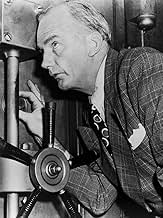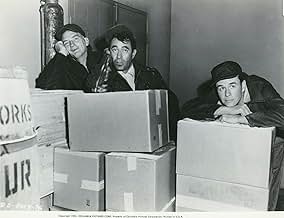A psychologist pioneers a research study at a prison. He seeks the help of six savvy inmates including a safe-cracker, a mobster, a pair of armed robbers and psychopath. Could he trust them?... Read allA psychologist pioneers a research study at a prison. He seeks the help of six savvy inmates including a safe-cracker, a mobster, a pair of armed robbers and psychopath. Could he trust them? What's in it for them?A psychologist pioneers a research study at a prison. He seeks the help of six savvy inmates including a safe-cracker, a mobster, a pair of armed robbers and psychopath. Could he trust them? What's in it for them?
- Awards
- 5 wins & 1 nomination total
Harry Morgan
- Dawson
- (as Henry Morgan)
Charles Bronson
- Jocko
- (as Charles Buchinsky)
Wesley Addy
- Bit Role
- (uncredited)
Jack Carr
- Harry Higgins
- (uncredited)
Dick Cogan
- Convict #2
- (uncredited)
Dick Curtis
- Guard
- (uncredited)
- Director
- Writers
- All cast & crew
- Production, box office & more at IMDbPro
Storyline
Did you know
- TriviaMillard Mitchell was the first actor to win a Golden Globe Best Supporting Actor award without receiving a corresponding Academy Award nomination. The other 6 in chronological order are: Earl Holliman in The Rainmaker (1956), Stephen Boyd in Ben-Hur (1959), Oskar Werner in The Spy Who Came in from the Cold (1965), Richard Attenborough in The Sand Pebbles (1966) then Doctor Dolittle (1967) (these two wins in successive years), Richard Benjamin in The Sunshine Boys (1975) and Aaron Taylor-Johnson in Nocturnal Animals (2016).
- GoofsThe convicts manage to carry off an elaborate scheme to bring Randall's wife from Canada and smuggle her into the prison simply so Randall can enjoy ten minutes of marital bliss. But there is no explanation offered as to just exactly how they got her out again, nor why Randall didn't go with her, if they did, after it's all over.
- ConnectionsReferenced in The Glass Wall (1953)
Featured review
A no big name cast, but a lot of solid character players make My Six Convicts a really original and worthwhile film about our penal system. What makes a convict tick, that's what psychologist John Beal is in the state prison system to find out and you be the judge if he did.
Beal is sent to San Quentin and since that's where this film was shot, I'll use that as the prison name to find out to see if we can better rehabilitate convicts. Actually part of the answer is supplied in Goodfellas where Henry Hill says that people who work are stupid. Just take what you want at least until you get caught.
This film is about the thousands of guys who aren't connected who do wind up in the joint for one reason or another, that group you saw demanding their meals while the wiseguys were dining elegantly. As in every prison picture any place of incarceration has its own set of rules and code which one had better learn quickly.
Beal needs a staff and he comes up with six of them, Gilbert Roland, Millard Mitchell, Alf Kjellin, Marshall Thompson, Jay Adler, and Harry Morgan. All join up with Beal for their own reasons, but all of them worry about confidentiality, a real important thing in Beal's research. But it's also something that the cons worry about when it comes to being a stool pigeon. And that's a guy with no popularity and limited life expectancy.
The six convicts are quite a study in convict Americana. Although all of these guys are near and dear as great character players my favorites would have to be Millard Mitchell, Gilbert Roland, and Jay Adler. Mitchell is your old convict who knows the system inside out and how and when to play people to get what he wants, he was an ace safecracker by trade before going in. Roland is a gangster who is doing his time and waiting to be deported where on his stashed loot he's going to live the good life.
Adler was a truly sad case, a guy who got greedy and caught and who is a great example of recidivism. After he gets his parole he doesn't know what to do on the outside so he deliberately violates parole to get back. A truly institutionalized human being and between the time of the making of this film and now, no one has found a way to deal with that.
My Six Convicts from Columbia's B picture unit is a great film of some wonderful case studies of the criminal mind.
s
Beal is sent to San Quentin and since that's where this film was shot, I'll use that as the prison name to find out to see if we can better rehabilitate convicts. Actually part of the answer is supplied in Goodfellas where Henry Hill says that people who work are stupid. Just take what you want at least until you get caught.
This film is about the thousands of guys who aren't connected who do wind up in the joint for one reason or another, that group you saw demanding their meals while the wiseguys were dining elegantly. As in every prison picture any place of incarceration has its own set of rules and code which one had better learn quickly.
Beal needs a staff and he comes up with six of them, Gilbert Roland, Millard Mitchell, Alf Kjellin, Marshall Thompson, Jay Adler, and Harry Morgan. All join up with Beal for their own reasons, but all of them worry about confidentiality, a real important thing in Beal's research. But it's also something that the cons worry about when it comes to being a stool pigeon. And that's a guy with no popularity and limited life expectancy.
The six convicts are quite a study in convict Americana. Although all of these guys are near and dear as great character players my favorites would have to be Millard Mitchell, Gilbert Roland, and Jay Adler. Mitchell is your old convict who knows the system inside out and how and when to play people to get what he wants, he was an ace safecracker by trade before going in. Roland is a gangster who is doing his time and waiting to be deported where on his stashed loot he's going to live the good life.
Adler was a truly sad case, a guy who got greedy and caught and who is a great example of recidivism. After he gets his parole he doesn't know what to do on the outside so he deliberately violates parole to get back. A truly institutionalized human being and between the time of the making of this film and now, no one has found a way to deal with that.
My Six Convicts from Columbia's B picture unit is a great film of some wonderful case studies of the criminal mind.
s
- bkoganbing
- Oct 7, 2012
- Permalink
Details
- Runtime1 hour 44 minutes
- Color
- Aspect ratio
- 1.37 : 1
Contribute to this page
Suggest an edit or add missing content






































